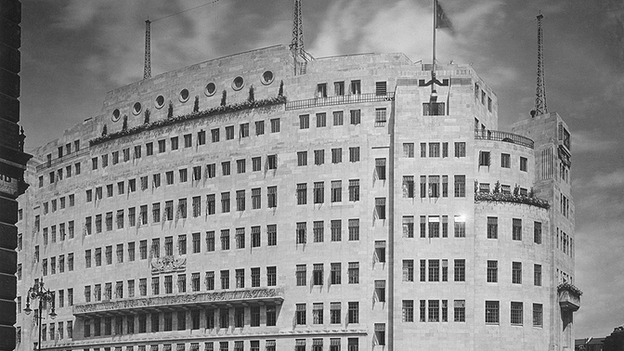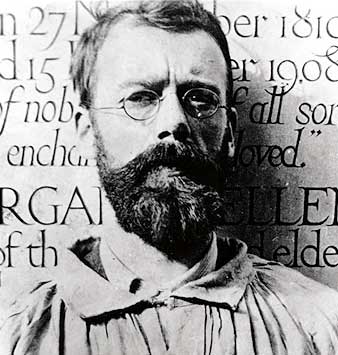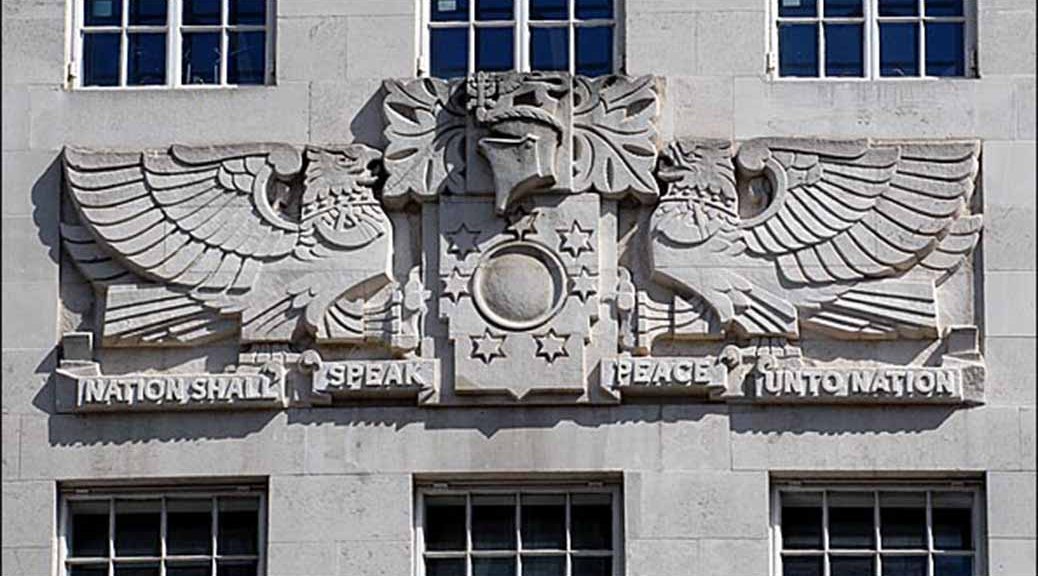Etched in stone high on the front wall of BBC Broadcasting House is the BBC‘s motto, adopted in 1927 to represent the purpose and values of the corporation:
Nation Shall Speak Peace Unto Nation
Based on biblical scripture, this motto inspired the first thing you see when you walk in the front door of the Art Deco foyer, a huge gilded inscription which reads:
This temple of the arts and muses is dedicated to Almighty God by the first Governors in the year of our Lord 1931, John Reith being Director-General. And they pray that good seed sown may bring forth good harvest, and that all things foul or hostile to peace may be banished thence, and that the people inclining their ear to whatsoever things are lovely and honest, whatsoever things are of good report, may tread the path of virtue and wisdom.

How could a temple dedicated with a prayer to Almighty God not be founded on deeply held religious and philosophical beliefs?
How could a motto, placed high on the front of the building, that nation shall speak peace unto nation, not be interpreted as meaning the BBC has the higher purpose of promoting cultural interchange and social cohesion?

How could anybody entering the hallowed portals of that building ever possibly claim they were not aware they were entering a temple dedicated to that higher purpose?
How could any BBC employee who claimed they either weren’t aware of, or didn’t believe in, that higher purpose not be either a liar or a hypocrite?
And yet, incredible as it may seem, that’s exactly what the BBC spent licence payer’s money proving in the Court of Appeal last summer in the case of Maistry v BBC , when Lord Justice Underhill ruled that it was “unquestionably right” and “ a question of fact” that BBC employees were not aware that any of their colleagues actually believed in BBC values!
How could that happen? How could an institution founded on such deeply held religious and philosophical beliefs end up spending the public’s hard-earned cash supporting those who don’t believe in its fundamental founding principles and persecuting those that do?
The people who wrote and carved those inscriptions as prayers to “Almighty God” must be turning in their graves.

With their religious and philosophical beliefs carved on the front of the building and in the entrance hall for all the world to see, they would have thought that any employee who claimed they weren’t aware of them was either blind or insane.
And that any legal system that judged that absence of awareness to be “unquestionably right” and “ a question of fact” was so broken and corrupt it was in urgent need of fixing.
And if the day ever came when BBC Governors had become so decadent and perverted that they employed people who didn’t believe in the BBC‘s higher purpose and sacked those that did, they’d be the first to be calling for their heads.

But you can see how the liars and hypocrites managed to pull it off. It’s the old spin doctor’s trick of gradually twisting the meaning of things until they end up meaning the exact opposite of what they originally meant
First they turned religion from a source if love, joy and peace into a terrorist threat.
Then they come over all embarrassed about the “august”, “archaic” and “outmoded” religious inscriptions on their building.
Then they get English Heritage to restore them as ancient relics of a bygone age.
Then they can ignore them and replace them with a shiny new building and shiny new set of “mission statements” written in corporate doublespeak which actually mean sweet FA.
Interestingly, what the BBC doesn’t come over all embarrassed about is the carving of a man and a naked boy above the front door of Broadcasting House.
Carved by leading 20th Century artist, Eric Gill, whose own sexual predilections included having sex with two of his daughters and the family dog!

Despite repeated pleadings from survivors in the wake of the Jimmy Savile scandal, the BBC has no plans to remove or replace it.
But, whatever anybody may think about art, paedophilia or religion, the plain and simple truth is that Broadcasting House is literally a “temple” “dedicated” to “Almighty God” and, in the words of Robert Seatter, Head of BBC History:
“For many people, Broadcasting House is the BBC.”
So when any BBC employee claims they are either unaware of or don’t believe in the principles carved on the walls of their own building it’s heresy sacrilege and hypocrisy on a stick.
The last time I looked in a dictionary, hypocrisy still meant “the claim or pretence of holding beliefs, feelings, standards, qualities, opinions, behaviours, virtues, motivations, or other characteristics that one does not in actual fact hold”.
So when Lord Justice Underhill ruled, in paragraph 13 of his judgement, that BBC values “might indeed be no more than their employer’s mission statement about the values that they were expected to observe at work”, what he was essentially saying is that the BBC are hypocrites.
How much longer will licence payers keep supporting an organisation that spends their hard-earned money proving its own hypocrisy in court? Only as long as the licence-payers don’t know about it.
The shiny new BBC Governors in their shiny new building may think they’ve won a victory with their shiny new mission statements, when in fact they’ve just shot themselves in the foot.




All of which calls for a fun ‘spot the difference’ challenge. Bear in mind that a mission statement has been clarified by the judiciary to mean a goal to aspire to rather than the substance of a serious belief; in short corporate froth. And of course the BBC does not have a mission statement. It has a world famous mission to inform, educate and entertain and, since 2003, a written statement of values.
To support its claim that the BBC Values are no more than a mission statement the BBC referred the Tribunal to the following statement of values, which appears on BBC passes and its websites.
Trust is the foundation of the BBC: we are independent, impartial and honest.
Audiences are at the heart of everything we do.
We take pride in delivering quality and value for money.
Creativity is the lifeblood of our organisation.
We respect each other and celebrate our diversity so that everyone can give their best.
We are one BBC: great things happen when we work together.
The Tribunal records the following finding of fact:
In its conclusion at paragraph 21 the Tribunal repeats this description of the Values and says:
But of course this is the BBC statement of values re-writ. The vital pronouns “we” and “our” have been excised and replaced by “BBC”. The cardinal principle, “Trust is the foundation of the BBC” also goes. A collective and individual pledge of loyalty has become an anodyne corporate blurb…the very thing, a mission statement which imposes no obligation. The real BBC Values must of course be followed, “lived and breathed” as the Management Board says.
Curiouser and curiouser!
LikeLike
I think you’re being way too generous to the BBC and Judiciary. No doubt it is curious, but the further you go down the road of satisfying that curiosity the more difficult it is to believe that it’s anything except a bare-faced scam.
The way the Tribunal accepts as “evidence” in its own conclusion the BBC’s misrepresention of its values as nothing more than “behavioural characteristics” incorporated into a “mission statement” is a prime example of circular reasoning and rhetorical tautology.
Circular reasoning because it restates the BBC’s premise in the Tribunal’s conclusion instead of deriving its own conclusion from the evidence of what the BBC values actually say.
Rhetorical tautology because it’s an argument constructed in such a way that it’s logically irrefutable, while obscuring the lack of evidence or valid reasoning supporting the conclusion
If you’d known the Tribunal would simply accept the BBC’s misrepresentations of its values as “evidence” without bothering to verify for itself what the evidence actually was, then you could have challenged it. But you couldn’t know that until after the Tribunal was over, when it was too late to do anything about it. If that’s not a bare-faced scam then what else is it?
LikeLike
I had been following the Maistry vs BBC tribunal closely – it was enough to cause total disillusionment with the British justice system and media. It demonstrated just how much irrationality , mercilessness, arrogance, ignorance and plain ruthlessness actually exists at the highest levels of the system. Ganging up on the vulnerable is ‘just not cricket’, as the English need reminding.
LikeLike
It all depends what you mean by cricket. There are two very different kinds of cricket. One is how the English tell Johnny Foreigner it should be played. The other is how they actually play it themselves. Just Google Bodyline and you’ll see what I mean.
There are also two different kinds of English. One is the superior, top drawer type that claims to represent all that’s good about England. The other are the commoners who were on the receiving end of English treachery and tyranny long before Johnny Foreigner ever was. Just Google Perfidious Albion and you’ll get the idea.
LikeLike